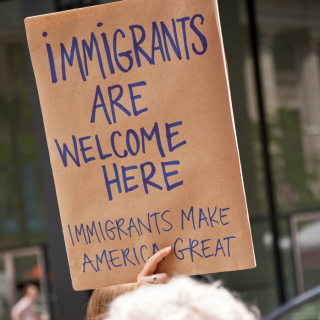Advertisement
Engagement with the 2018 Women’s March was strong in Washington, Las Vegas, and about 250 other U.S. cities. On January 20 about 3,000 marched from the Greater Columbus Convention Center to the Ohio Statehouse. With this year’s Power to the Polls theme, organizers sought to channel energy from the #MeToo revelations and President Trump’s low approval rating among women into electoral gains for women and progressive candidates in the midterm elections.
“Last year was a historical moment,” said Rhiannon Childs, Executive Director of Women’s March Ohio. “This year we’ve turned that moment into a movement. We wanted to take our collective power, unleashing our ability to organize and mobilize, and take that same energy to the polls to get more women and progressive candidates into office.”
As often happens with mass social movements, debate has erupted among groups and individuals engaged in it. In Ohio there is controversy over the narrow focus on electoral politics, and claims that the voices of women of color and other marginalized groups have been excluded from the Women’s March since its inception last year.
On January 7 Black Lives Matter Cincinnati issued a statement explaining why they would not be joining the Women’s March in their city: “The Women’s March is a gathering and a display of power, but it is also a poorly veiled campaign to elect more Democrats to ‘resist Trump.’ The main demand being made of marchers is to register to vote and the ‘take back the polls.’ We believe this is the weakest demand possible and the tacked on broader demands have little meaning when the main message is to ‘pull a lever.’ The main demand not only disenfranchises countless black women and women of color, but also totally misses the point of women’s liberation…. Even if all women could vote, the electoral system does not let anyone vote their way to liberation from oppression.
“The fight for women’s liberation has never been led by the Democratic party or any other party that props up and supports this social system. At best these parties have tailed public sentiments and given lip service.” BLM Cincinnati held its own separate political event on January 20.
“We have to come together,” said Rhiannon Childs. “It’s our duty to make sure that all voices are heard. That means a lot to me, as a black woman. We try our best to center with communities of color, because they are the most oppressed. But these conversations are just now coming to the forefront openly.”
Childs is working to build a stronger relationship with BLM Cincinnati, and plans to have a sit-down meeting with them soon. “We’re going to have those moments of education. People may have not thought of those concerns before, but that’s why we’re having discussions, to bring awareness,” she said. Childs also plans to meet with United We Stand Cincinnati, the group that organized the Women’s March there.
The national leadership of Women’s March includes three women of color: Tamika Mallory, Carmen Perez, and Linda Sarsour.
Childs is also Digital Communications Manager at Planned Parenthood Advocates of Ohio. “The Ohio legislature continues to put restrictions on reproductive health care,” she said. “It’s important to get women in office who care about our concerns. Our reproductive freedom is being stripped away every day.” Many women who are running for office spoke at the Columbus march. Some are new to politics. Ohio has been added to the Power to the Polls tour, which will soon launch a statewide voter registration drive.
Socialist Alternative Columbus co-hosted the Women’s March in Columbus. “We absolutely cannot allow our movement to be limited by corporate establishment politicians,” said organizer Dana White. “Our elected representatives, especially Democrats, should be held accountable to stand up and fight for sexual harassment protections, healthcare for all, a $15 minimum wage, equal pay, paid parental leave, and quality public childcare.
“We haven’t seen many elected representatives from either party yet who are willing to stand against corporate power and use their platform actually build the movements we need to truly stop sexual violence and take on the corporate interests that are opposed to single payer healthcare, higher wages, and free higher education,” White said. “It's going to require a real fight and it’s going to require all of us building a massive political movement!”




